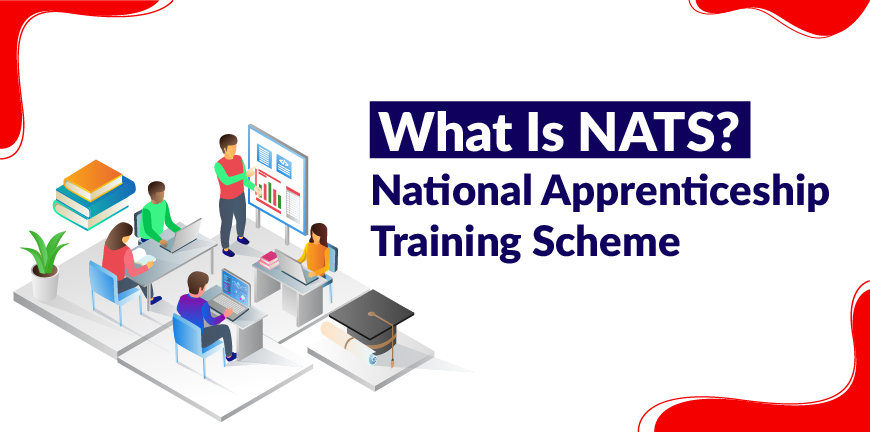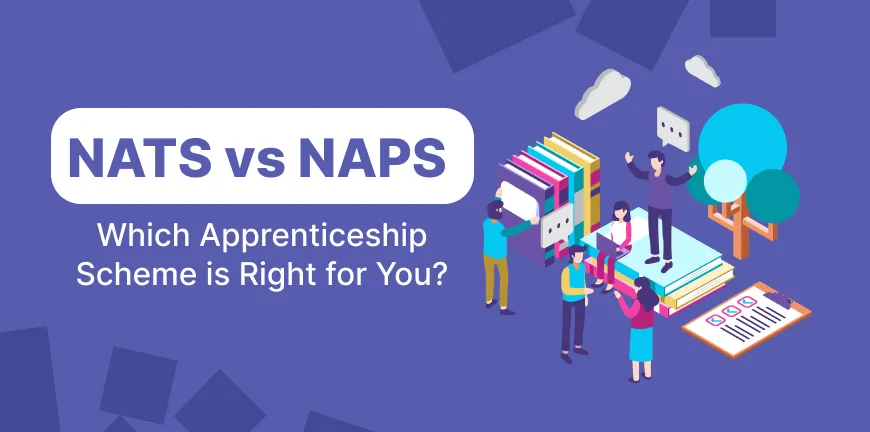
Predictive People Management: Using Workforce Forecasting Tools to Stay Ahead
10/08/2025
The Rise of Skills-Based Hiring: What It Means for HR Professionals and Talent Acquisition?
20/08/2025- What Is the National Apprenticeship Promotion Scheme (NAPS)?
- How Does the NAPS Scheme Work for Employers and Apprentices?
- What Are the Key Benefits of NAPS for Companies?
- How Is the NAPS Program Implemented Through an Authorised TPA?
- How Can Apprenticeship Training Be Customised to Fit Business Needs?
- What Strategies Help Optimise the NAPS Scheme for Business Growth?
- What Are the Common Challenges in Implementing NAPS and How to Overcome Them?
- Why Should Businesses Consider Working with an Authorised TPA?
- Key Takeaways
- Frequently Asked Questions
The role of apprenticeship has become critical to tap the potential of our youth and the growth of the economy. Apprenticeships bridge the skill gap between education and employment, helping produce a truly job-ready workforce.”- Ved Mani Tiwari, CEO & MD of NSDC.
Are you a startup or a market leader looking to integrate the NAPS scheme as a part of building a job-ready talent pipeline?
All successful companies have one aspect in common: They have a perfect mix of fresh and experienced talent supporting each other in carrying out daily business operations. However, blending fresh talent into the existing workforce without basic training or skills can create numerous hurdles, resulting in operational disruptions & reduced productivity.
Creating a well-structured apprenticeship training program under the NAPS scheme can be a game-changer and help companies build job-ready talent on par with industry standards.
Let’s have a detailed discussion on how companies can benefit from the NAPS scheme and accelerate business growth.
What Is the National Apprenticeship Promotion Scheme (NAPS)?
NAPS or National Apprenticeship Promotion Scheme is a structured skill development program launched by the Ministry of Skill Development & Entrepreneurship (MSDE) to promote apprenticeship training in India.
The key benefit from the NAPS scheme is partial stipend support for apprentices engaged in skill development training under the Apprentice Act, 1961 and offers advocacy assistance to the stakeholders.
As of June 30, 2025, 8,52,376 apprentices are getting trained under NAPS-2 across India, with 1,95,680 women apprentices participating, according to the Press Information Bureau of India. The key objectives of the NAPS-2 scheme include:
- To build a skilled workforce through on-the-job experiential training that fosters the country’s economic growth.
- To encourage private firms to enrol apprentices by offering partial stipend support.
- To offer additional upskilling opportunities to candidates who have already undergone short-term skill training under various schemes offered by the Central and State Governments.
- To encourage apprentice enrolment in MSMEs.
- To drive employment opportunities in underserved areas like aspirational districts and the North-East Region
The expected outcomes from NAPS include:
- The Ministry of Skill Development and Entrepreneurship aims to train 46 lakh apprentices from 2022 to 2026.
- Promote apprenticeships in India and assist companies through various measures to speed up the performance of approved apprenticeships.
- To enhance the conversion rates of apprenticeship to permanent employment across all government and private sectors.
- Create innovative models to reserve & upgrade existing apprenticeship systems in the informal economy.
How Does the NAPS Scheme Work for Employers and Apprentices?
Here is how the NAPS scheme works for employers and apprentices respectively:
NAPS Scheme for Employers
The National Apprenticeship Promotion Scheme (NAPS) incentivises private firms (startups to MNCs) to enrol apprentices by contributing part of their training costs. Here are the steps through which companies can benefit from the NAPS scheme:
1. Financial Support
Companies that enrol apprentices through NAPS receive a reimbursement of 25% of the prescribed stipend. The maximum contribution made by the government will be up to Rs. 1,500 per apprentice per month. Companies must bear the remaining 75% cost. This incentive helps companies minimise the direct cost of training.
2. Basic Training Support
If the enrolled apprentices necessitate basic training before joining the workplace, the government is ready to reimburse up to Rs. 7,500 per apprentice to the agency that offers pre-apprenticeship training.
3. Ease of Hiring
Companies can register on the official apprenticeship portal of India, post opportunities, & select candidates without complex recruitment procedures. Alternately, companies can recruit apprentices from the top third-party NAPS recruitment agencies like ALP Consulting through a simple hiring process initiated by the HR team of ALP.
4. Skilled Workforce Pipeline
Companies can train candidates to align with specific operational needs. This ensures they develop job-ready talent with skills matching industry standards.
5. Compliance & Records
Another benefit from the NAPS scheme is that it simplifies record-keeping through an online portal. This ensures easy stipend disbursal tracking and compliance reporting.
NAPS Scheme for Apprentices
For apprentices, NAPS creates a bridge between education and employment by offering paid, on-the-job training. Here’s how apprentices can maximise the benefit from the NAPS scheme:
1. Stipend Earnings
Apprentices receive a monthly stipend and support during their training period, jointly paid by the employer & subsidised by the government. This provides financial support during skill development. The following table describes the stipend support received by apprentices enrolled via the NAPS scheme based on educational qualification and existing skills.
| Educational Qualification Preferred (Applicable only for candidates who have passed) | Minimum Monthly Stipend (Rs) |
| Class 5-9 | 5,000 |
| Class 10 | 6,000 |
| Class 12 | 7,000 |
| National or State Certificate holders like ITI | 7,000 |
| Vocational or Technician Apprentice Certificate Holders | 7,000 |
| Diploma holders | 8,000 |
| Graduate or Degree Holders | 9,000 |
2. Practical Skill Development
Apprentices can benefit from the NAPS scheme by gaining hands-on experience via real industry exposure, creating more chances of employment once training is done.
3. Basic Training (if required)
For those without prior skills, NAPS ensures they undergo structured basic training before they begin the workplace component.
4. Nationally Recognised Certification
On completion of the NAPS training period, apprentices receive certification under the Apprentices Act. This enhances their career prospects in India & abroad.
5. Employment Pathway
Many employers offer permanent roles to high-performing apprentices, making it a great option for achieving permanent employment.
What Are the Key Benefits of NAPS for Companies?
Here are 5 ways through which companies can benefit from NAPS scheme:
1. Cost Savings
Companies receive up to 25% stipend reimbursement with a maximum cap of Rs. 1500 per apprentice. This reduces training expenses for companies while maintaining a steady flow of skilled manpower.
2. Customised Workforce Development
Companies can provide customised training to apprentices enrolled under the NAPS program. This ensures job-ready apprentices are aligned with organisational standards from Day 1.
3. Ease of Compliance
National Apprenticeship Promotion Scheme offers an easy-to-navigate online platform for registration, stipend management, and record-keeping for companies interested in enrolling apprentices. This reduces administrative burden and ensures legal compliance under the Apprentices Act.
4. Large Talent Pipeline Creation
Employers can groom apprentices & offer full-time employment for high performers. This lowers recruitment costs & turnover rates as hired talent is pre-trained and culturally suitable.
5. Enhanced Brand Value
Companies that can leverage the NAPS scheme can position themselves as government-recognised partners in skill development. This can act as a brand endorsement strategy, allowing companies to attract talented candidates and motivate them to join their firm as a NAPS apprentice with a high chance of gaining permanent employment.
How Is the NAPS Program Implemented Through an Authorised TPA?
Companies planning to bring the NAPS program to their work ecosystem can partner with reputable third-party agencies, such as ALP Consulting, to make the enrollment process seamless and efficient. The steps below showcase how TPA will help companies recruit apprentices by leveraging the benefit of NAPS scheme:
1. Company Onboarding & Registration
The TPA will register the client company looking to enrol NAPS trainees on the Apprenticeship Portal designed by the Ministry of Skill Development & Entrepreneurship. The TPA will verify eligibility & set up employer profiles to kick start NAPS participation quickly and compliantly.
2. Apprentice Sourcing & Screening
The TPA will scout for suitable candidates via databases, job fairs, social media, and partnerships. They ensure shortlisted candidates have the expected educational qualifications & basic skills as per NAPS standard expectations.
3. Documentation & Compliance Management
The TPA takes complete care of apprenticeship contracts, training plans, & statutory compliance filings. This systematic approach ensures every step meets the Apprentices Act norms & audit requirements.
4. Training Coordination & Monitoring
The TPA will set up basic and on-the-job training sessions. They also track apprentice progress and coordinate assessments to meet NAPS guidelines & company skill needs.
5. Stipend Disbursal & Claim Processing
The TPA facilitates stipend payment to apprentices, submits reimbursement claims to the government, and ensures the timely receipt of NAPS financial benefits for the client company that engages in this program.
How Can Apprenticeship Training Be Customised to Fit Business Needs?
Here are 6 steps that companies can implement to customise apprenticeship training that fits business needs and gain unique benefits from the NAPS scheme:
1. Identify Skill Gaps
Carry out a detailed workforce skills audit to lock in specific roles, competencies, & technical abilities needed. The audit outcomes help in creating apprenticeship training modules that are in line with the company’s operational & growth objectives.
2. Design Role-Specific Curriculum
Develop a training curriculum tailored to job functions & fulfil NAPs requirements. The expert trainers must skilfully embed company processes, industry standards, & emerging technologies in the training document to help apprentices seamlessly integrate into the workplace.
3. Blend Basic & On-the-Job Training
The expert training team must blend government-supported basic training with hands-on and company-specific projects. This ensures apprentices can experience both worlds & acquire both foundational acumen & practical skills ideal to manage daily business operations.
4. Leverage Internal Mentorship
Create dedicated training slots & allocate experienced employees as coaches accordingly to apprentices. These mentors will provide personalised guidance, provide real-time feedback, & offer industry insights. This expertise involvement will accelerate skill development that aligns with the company culture.
5. Integrate Performance Tracking
The expert training team must use regular assessments, KPI monitoring, & feedback sessions. This helps in measuring apprentice progress and refining training modules to better serve evolving business requirements.
6. Align with Career Pathways
The training team at TPA must design apprenticeship programs with clear progression into permanent roles. This ensures skills learned directly contribute to long-term organisational staffing plans & employee retention strategies.
What Strategies Help Optimise the NAPS Scheme for Business Growth?
Here are some proven strategies to maximise the benefit from the NAPS scheme and accelerate business growth:
1. Target Critical Roles First
Create apprenticeship programs that fit perfectly to meet high-demand positions. This targeted approach ensures training investments directly address talent shortages & contribute to faster operational scalability.
2. Leverage Government Reimbursements
Maximise NAPS’ financial benefits as much as possible by maintaining accurate records, timely stipend disbursal, & full compliance. This will help companies to secure all available government reimbursements without delays.
3. Collaborate with Authorised TPAs
Enter a long-term partnership with a NAPS specialist third-party agency like ALP Consulting for recruitment, training, & compliance. This allows businesses to focus on core operations while ensuring smooth NAPS implementation.
4. Integrate with Workforce Planning
Align apprenticeship intake events with business expansion plans. This time-driven strategy ensures a continuous supply of trained talent that supports new projects, products, or market entries.
5. Measure ROI on Training
Track productivity gains, cost savings, and retention rates from apprentices to evaluate program impact. This will help in refining future NAPS strategies for maximum business growth.
What Are the Common Challenges in Implementing NAPS and How to Overcome Them?
Here are 5 challenges encountered by businesses in implementing the NAPS program and possible solutions to overcome them.
1. Low Awareness of NAPS Benefits
Most firms, especially SMEs, are naive about the financial reimbursements, simplified compliance, & workforce development potential under NAPS.
This lack of understanding can result in underutilisation of the NAPS program & make companies lose out on opportunities to create a job-ready talent pipeline with less investment.
Solution: Conduct targeted awareness drives, webinars, & HR training sessions. Also, leverage authorised TPAs like ALP Consulting or industry associations to get more acumen on benefits, processes, and success stories of the NAPS initiative.
2. Complex Registration & Compliance Process
The Apprenticeship Portal, legal requirements, and stipend claim procedures can be confusing sometimes for companies that are not experienced with offering apprenticeship training programs. This may cause delays or missed reimbursements.
Solution: Hand over the responsibility to seasoned TPAs or assign dedicated compliance personnel to oversee registrations, training contracts, stipend disbursal tracking, and documentation. This approach ensures timely government claim approvals without much fuss.
3. Difficulty in Sourcing Skilled Candidates
Companies may get into a conundrum to get the desired apprentice profiles equipped with the required technical skills, work ethic, or learning capacity.
Solution: Build strong linkages with ITIs, polytechnics, universities, and skill councils. Also, participate in job fairs, and leverage the Apprenticeship Portal’s database to access pre-vetted & qualified candidates.
4. High Dropout Rates
There are a lot of instances where apprentices quit the NAPS program midway due to insufficient stipend amount, unclear career progression, or better offers elsewhere.
Solution: Companies can offer competitive stipends that are more manageable, provide skill certifications, career path clarity, mentorship, & performance-based rewards to enhance engagement and retention.
5. Misalignment of Training with Business Needs
Generic training modules that are in line with NAPS, but not adequate to equip apprentices with company-specific operational skills, will create a lose-lose situation for companies & apprentices.
Solution: Integrate tailored on-the-job training modules designed around business processes rather than making it generic. Also, use internal experts as trainers, and regularly review training outcomes to ensure alignment with production & service delivery needs.
Why Should Businesses Consider Working with an Authorised TPA?
Here are 5 reasons why businesses must collaborate with a TPA like ALP Consulting to benefit from the NAPS scheme:
1. Expert Compliance Handling
TPAs manage all legal, documentation, and portal processes. This ensures businesses stay compliant with the Apprentices Act & secure timely government reimbursements without multiple follow-ups.
2. Efficient Apprentice Sourcing
TPAs have unlimited access to candidate databases, ITIs, and training networks. This enables businesses to quickly source qualified apprentices suited to specific job roles and skill requirements.
3. Customised Training Support
TPA’s expert training team will come up with effective training modules that blend NAPS guidelines & business needs. This approach combines basic training with on-the-job learning, empowering apprentices to transform into job-ready talent suitable for permanent employment.
4. Cost & Time Savings
Outsourcing recruitment, training coordination, & compliance to a reputed TPA can be a game-changer move. It allows businesses to save internal resources, reduce operational overheads, and focus on core activities while still benefiting from NAPS incentives.
5. Streamlined Stipend Management
TPAs facilitate stipend disbursal, maintain accurate records, & process government reimbursement claims efficiently. This ensures businesses receive financial benefits promptly without cash flow disruptions.
Key Takeaways
- NAPS offers employers stipend reimbursement and training cost support to promote skilled workforce development.
- Apprentices gain hands-on experience, stipends, and certifications, improving employability and career prospects.
- Authorised TPAs streamline recruitment, training, compliance, and stipend claims for seamless NAPS implementation.
- Customised apprenticeship programs align training with specific business needs, boosting operational efficiency.
- NAPS benefits all sectors, supporting MSMEs, startups, and large enterprises in building future-ready talent pipelines.
Frequently Asked Questions
1. What is the full form of NAPS?
The abbreviation of NAPS is National Apprenticeship Promotion Scheme. It is a Government of India initiative to incentivise and promote apprenticeship training across industries.
2. What is the National Apprenticeship Promotion Scheme (NAPS)?
NAPS is a government program that provides financial and advisory support to employers for engaging apprentices, aiming to boost skill development and employability nationwide.
3. Who can apply under the NAPS scheme?
Any Indian citizen meeting educational requirements or employers from eligible industries can apply for the NAPS scheme through the official Apprenticeship Portal.
4. What are the eligibility criteria for companies under NAPS?
Companies that are registered entities and compliant with the Apprentices Act can enrol under NAPs. Additionally, these organisations must have the requisite infrastructure and the capacity to train apprentices in designated trades.
5. What are the benefits of NAPS for employers?
Employers with a strong NAPS program can get stipend reimbursement, a skilled workforce pipeline, reduced hiring costs, streamlined compliance, and government-backed training support.
6. How does NAPS support skill development in India?
By combining classroom training with industry exposure, NAPS equips apprentices with job-ready skills aligned to current & future market needs.
7. Is NAPS applicable to all sectors and industries?
Yes, NAPS covers manufacturing, services, agriculture, & other sectors listed under designated and optional trades in the Apprentices Act.
8. How is NAPS different from other apprenticeship schemes?
NAPS offers direct employer financial incentives, covers broader trades, and simplifies online compliance compared to traditional schemes.
9. What is the financial assistance offered under NAPS?
Employers receive 25% of stipend reimbursement (maximum up to ₹1,500/month per apprentice) and basic training cost reimbursement (up to ₹7,500/apprentice).
10. How can an employer register for NAPS online?
Companies can register for NAPS online by signing up on the official Apprenticeship portal, completing company details, uploading documents, and creating apprenticeship opportunities.
11. What documents are required for NAPS registration?
The documents necessary for NAPS registration include company registration proof, PAN, GST, bank details, authorised signatory ID, trade license, and training infrastructure details.
12. Can small businesses also benefit from NAPS?
Yes, NAPS financially supports MSMEs in training apprentices. This reduces workforce costs and builds skilled talent for business growth.
Contact Us For Business Enquiry

Suresh Ramkrishna
Suresh Ramkrishna is the Operations Manager at Alp Consulting Ltd., with over 30 years of extensive experience spanning recruitment operations, sourcing, supply chain management, and client relations. At Alp, he leads the Search & Staffing Practice, specializing in bilingual and niche skill hiring while overseeing Japanese language and TITP (Technical Intern Training Program) initiatives. He also manages NAPS (National Apprenticeship Promotion Scheme) training programs, fostering skill development and workforce readiness across industries. Previously, he spent over two decades in the apparel export industry, managing vendor development and international sourcing for top global brands. Suresh’s leadership blends strategic talent acquisition with operational excellence across diverse industries.




